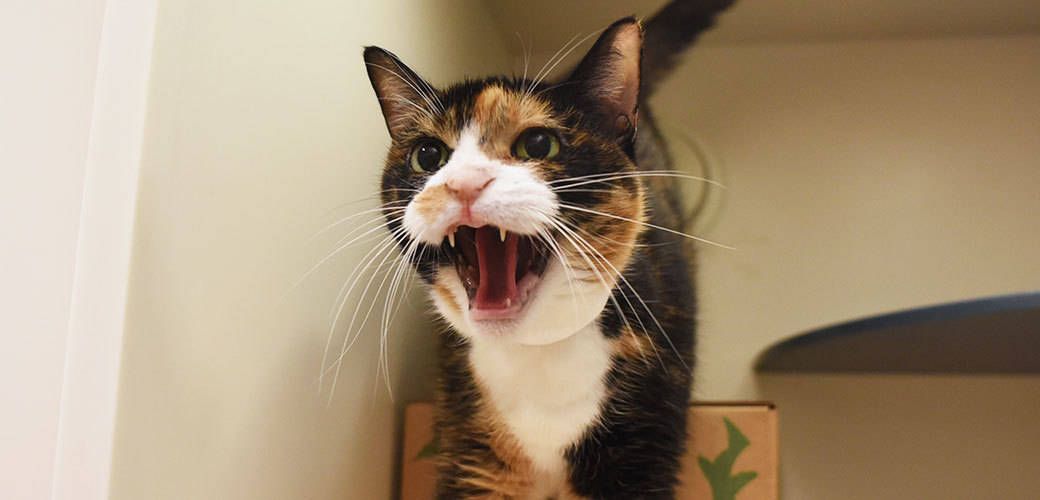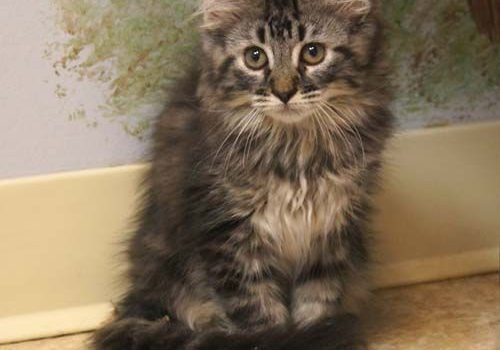The Maine Coon cat is a social, friendly breed who gets along with children as well as other animals in the house. The reputation of the breed is well earned and is a good basis to decide if a Maine Coon cat would suit your family. However, a breed standard is only a guideline. Individual cats sometimes develop behavioral issues, the most common of which are marking territory with urine and aggression. These can be triggered by a lot of different factors, and require patience and understanding from the pet parent. Addressing aggression or insecurity in cats can be difficult unless you are prepared to introspect and make changes in your home. To truly end behavioral problems, you have to first find out why your Maine Coon is acting the way he is.

Marking with Urine
Cats mark their territory with scent. While urine is widely known as a feline marker, cats also use brushing against things and scratching to get their scent on some surfaces[1]. The idea is not just to claim the area as their own but to indicate their presence to other animals. In the wild, the age of scratches on tree trunks can accurately tell the observer how long ago a cat had passed by that route. Cats also have scent glands on their cheeks and flanks. This is why your Maine Coon enjoys rubbing his face and his body against you so much. To all who have the heightened senses to note, your cat leaves a reminder that you belong to him.
This adorable, possessive display takes a somewhat annoying turn when you find that your Maine Coon has been drenching couch cushions, walls, and carpets with his urine. Cats will always mark their homes in some way, but when they resort to excessive peeing to establish territory, the reasons can be one of three things[2]:
- Your Maine Coon is unneutered or unspayed: Intact Maine Coons often feel an irresistible urge to mark[3]. Their territorial senses are usually on hyper-drive, and they’re always worried about defending their home. It’s a stressful life, and while this instinct helps them survive in the wild, a domestic cat’s life doesn’t have any threats to justify this behavior. It’s kinder and more reasonable to have your Maine Coon fixed before they are six months old. The habit of marking tends to form as the cat reaches maturity and the earlier a cat is neutered, the more easily the routine is broken.
- Your Maine Coon is anxious or scared: Cats thrive in safe and healthy environments. However, a sudden change in their life can easily stress them out. The appearance of a new animal or human in the house, changing addresses, or even switching the litter or food they are used to can trigger anxiety related urination. If your Maine Coon is stressed, he will try to get your attention with his behavior.
- A visit to the vet is in order: While most often your Main Coon’s spraying problem is behavioral, there can also be a medical issue behind it. If the cause of your cat’s marking is not immediately obvious, then take him to the vet for a thorough check-up. The most common, medical cause for excessive urination outside the litter box is a Urinary Tract Infection. A UTI is extremely painful for cats and may cause them to cry out while they pee. Neglecting UTI for too long can be fatal for your cat.
Aggression
While every cat parent can claim to have suffered the occasional scratch or bite, Maine Coon’s in general tend to be quite careful with their claws and teeth. If your cat has started regularly biting or scratching people – whether it is through rough play or suddenly, for no discernable reasons – it is not something to be ignored. Most pet parents assume that the tendency will fade, but tolerating an unacceptable behavior is the same as encouraging it in your Maine Coon. They’ll learn that it’s an approved way to express themselves.
- You cat has learned to play rough: Most bad habits in cats form early. Playing with your kitten with bare hands is a common mistake most cat parents make[4]. It’s adorable when a ball of fluff looks at your hand with wide-eyes and tries to pounce on it. If the same behavior persists through adulthood, however, the game is no longer fun for humans.
- Your Maine Coon is overstimulated: While most cats love to be petted, Maine Coons have sensitive coats and can get overstimulated after a point[5]. Cats feel an increase in pent up energy after every petting session. Sometimes this drives your pet to attack the nearest object – your hand – with a quick nip, and sometimes he gets off your lap and bites your other cat or dog. There are also certain areas of your cat’s body where petting triggers a bite or a scratch. Don’t let children or other members of your family keep petting them there for the fun of watching your cat pounce on their hand. Aside from the fact that an average sized Maine Coon can cause quite a lot of damage, if your cat feels extra sensitive about that area, there is a good chance that it pains them or there is a history of injury there.
- Your cat is redirecting stress: If your Maine Coon feels threatened or anxious about a change in their environment, they can sometimes act out by being aggressive. Try to parse out what might trigger this change in behavior. If a new cat or dog in the house is reason, try separating them for a few days and then slowly re-introducing them again.
- Your Maine Coon is unneutered or unspayed: Much like their tendency to spray and mark their area, an intact cat feels every territorial emotion to a heightened degree. An unneutered male and female will both react excessively to every perceived threat to their environment. Lashing out in such a state is a normal, primal part of their nature. Have your cat fixed as early as possible to avoid most of the behavioral problems that crop up in later life[6].
Reference List
[1] What to Do If Your Cat Is Marking Territory
[5] Feline Behavior Problems: Aggression
[6] Aggression in Cats | Common Cat Behavior


